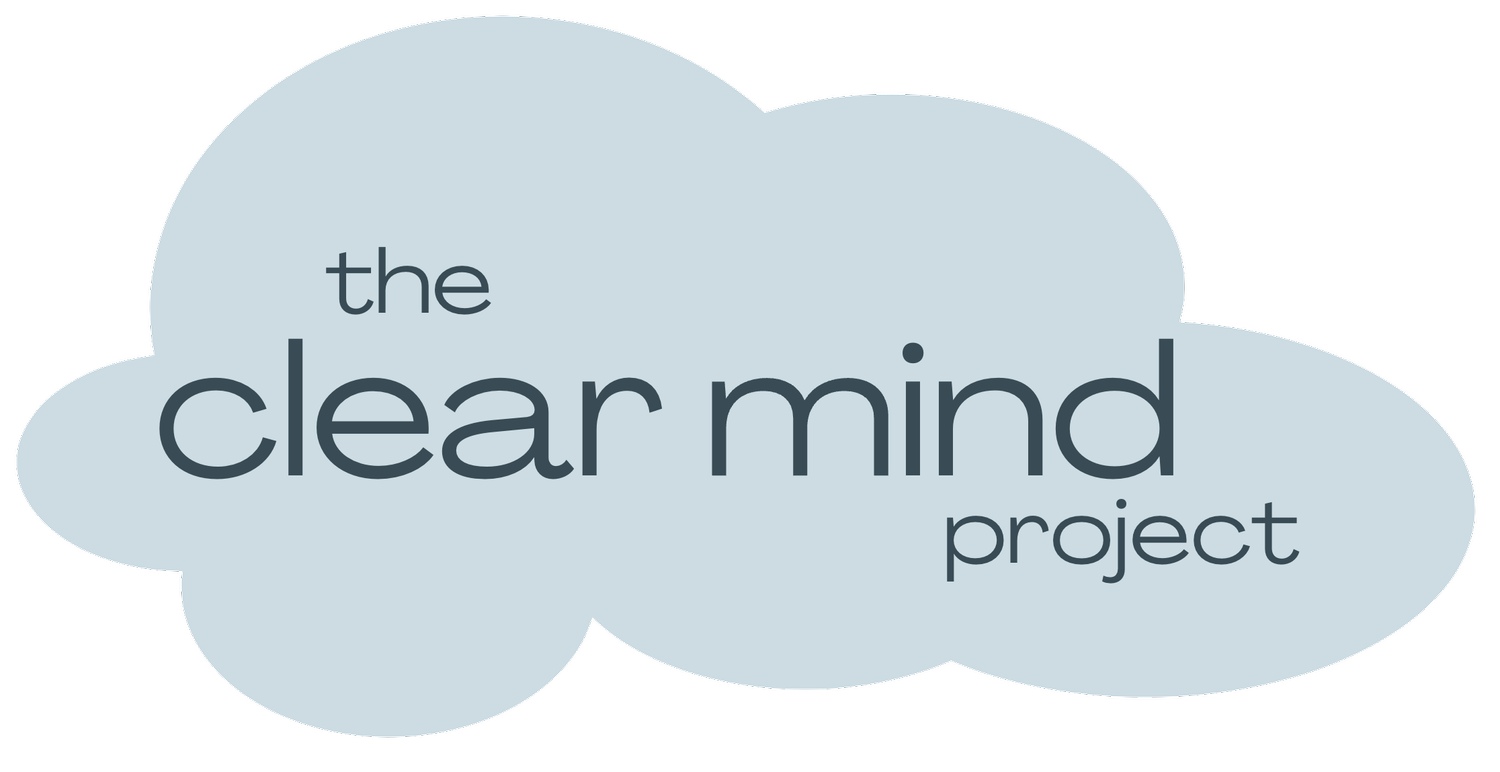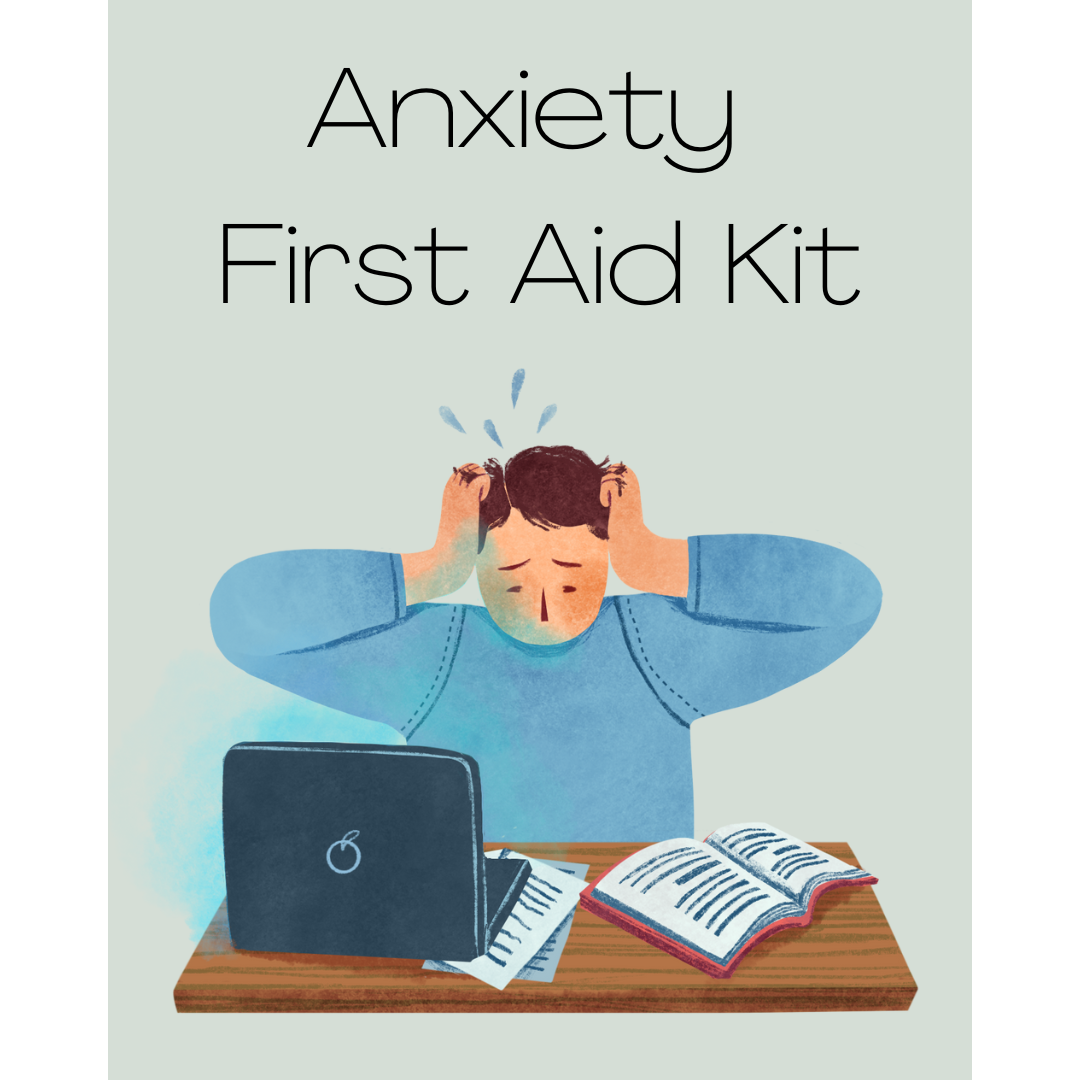Welcome to our Anxiety First Aid Kit. This page is designed to help those who might be in the middle of an anxiety crisis, as well as those who have anxiety in general and are looking for tools and strategies to cope.
Often, different people find that certain tools or strategies work better for them than others. We recommend that you give each of the recommendations on this page a chance, to have the best chance of finding what works for you!
What is Anxiety?
Anxiety is a feeling of worry or fear that is often related to the future, the unknown, other people’s perceptions or expectations from oneself or others. A certain amount of anxiety is a normal part of life.
Anxiety is our brain’s response to coping with stress, and prompting us to take action. This was really helpful when we lived in caves and there were sabertooth tigers outside – anxiety is what makes us run and hide! Pre-empting a scarcity of food also helps us plan for the future accordingly. The problem is that in today’s world, for the majority of problems that make us anxious, there is no immediate remedial or physical action to be taken. We worry about things that we have no control over, or very little control over; something we said a week ago, or if our friends like us, or when we’re going to get time to do all of our homework, or what college we’re going to get into – sound familiar?
This causes an overload of anxiety, which uncontrolled, can interfere with daily life. When this anxiety reaches a peak, we might even have what is referred to as an anxiety attack, or panic attack. In an anxiety attack, we experience the physical symptoms of anxiety at the highest degree. These can include hyperventilating, dizziness, sweating, palpitations, a sense of impending doom, claustrophobia and more.
Here’s a helpful video from the School of Life:
Signs and Symptoms of Anxiety
You don’t have to be having a full-blown panic attack to be dealing with anxiety. More often, anxiety shows itself through a thousand little ways that on their own might not be noticeable, but build up to an overwhelming condition. Here are some signs and symptoms of anxiety that you may not have know about:
Lack of ability to concentrate
Tiredness
Hypervigilance (being overly alert)
Insomnia (not being able to sleep)
Hypersomnia (sleeping too much)
Nail biting
Under eating
Over eating
Needing everything to be clean all the time
Feeling too overwhelmed to do anything
Constantly asking for reassurance and validation from others
Headaches
Nightmares
Irritability
Shyness
Immediate Coping Strategies
Breathing
One of the easiest things you can do to bring a panic attack under control is to breathe. It sounds simple, but when you’re in the midst of an attack, your breathing can quickly start to feel out of control.
Here is a great one to start with:
Posture
Sitting down and putting your head between your legs can help stop you feeling dizzy, and provide a sense of groundedness. Continue breathing deeply while you do this.
Affirmations
Remind yourself that what you are feeling is simply anxiety, and that you are safe. While they may feel threatening and scary, panic attacks are not dangerous. Nothing is going to happen to you, it will end, and you will feel normal again. You are therefore more in control of this situation that your brain might be trying to trick you into believing. Try repeating to yourself one of the following phrases:
“I am safe.”
“I have survived my anxiety before. I will survive it now.”
“I’m grateful for my body, and I am in control.”
Alternatively, try focusing on a place, person or animal that makes you feel calm. A place might be home, somewhere you vacation, somewhere you want to travel to, or a fictional place – from a book or film. A person might be a loved one, a friend,
Tell someone
Having an anxiety attack is no more your fault than having a headache or an upset stomach. Anxiety is nothing to be ashamed about, and there is no need to suffer alone. In fact, trying to hide an anxiety attack can make it worse. If you’re somewhere with other people, find someone and tell them what is happening. If you’re alone, call someone on the phone.
Meditation
Finally, once the worst of your anxiety attack is under control, focusing on meditation can help to calm your mind and bring your adrenaline levels and breathing back to normal. Here is one that we love:
Long-term Coping Strategies
General anxiety is in some ways more complex and difficult to deal with than anxiety attacks. An anxiety attack is extremely disabling – most people cannot function when in the middle of one, and therefore have no choice but to try their best to deal with it.
General anxiety, on the other hand, is easier to quash and try to ignore. But, you cannot ignore it forever. Learning how to manage general anxiety is a hard task, but there are many resources that can help. Here are some of the ways in which we can manage anxiety long term:
Diet
One long-term tool is keeping a healthy diet. Keeping a diet is something that is achievable and it has been proven that some foods specifically help to reduce general anxiety. Here is a site that has some suggestions on what foods are best to ease anxiety.
Sleep
Sleep is something that we all need in our lives, but many of us struggle to achieve enough of it. Sleep deprivation (aka not sleeping enough) can heighten fatigue as well as anxiety levels. We know that busy schedules make it very hard to get enough sleep at night, and sometimes it can be hard to fall asleep with so much on your mind. Here something to help you dive into a deep sleep:
Also, if you want to read more into why sleep is necessary to ease anxiety, here is an article that explains it in more depth.
Exercise
Another great long-term strategy is exercising. Some great exercises for anxiety include jogging, biking or weights. But, if you are like me and you do not love those super intense workouts, one great exercise is just taking long walks. Taking walks alone and listening to music is a great way to clear your head and help lessen your anxiety. Also, if you want to exercise but you don't know exactly what to do, here are some online videos we love:
Time Management / Prioritizing
Anxiety can make even simple tasks feel really overwhelming, but when your life is as full as the average high schooler’s, it can seem impossible to keep on top of everything. However, facing this issue head on is dramatically better than trying to avoid it. Taking a step back and writing down everything you have to do in a day or a week, or even a month or semester, can help you prioritize tasks and plan your time.
We recommend using your school planner if you have one, a calendar (iCal, Google and Outlook are all great) for things that have to happen at a certain time (meetings and classes) and a to-do list for everything else. Seeing your tasks mapped out like this can help you take back control of your time, and it makes it easier to say “no” to things you just can’t fit in.
Meditation practice
Although meditation is a great immediate strategy, it is also an amazing long-term one too. Meditating once a day, or even once a week is great to calm down, ease anxiety and clear your mind. Some great meditation resources are the Calm and Headspace apps. But, there are also some great youtube options. Here are some of our favorites:
Yoga practice
Another great way to clear your mind and bring your anxiety levels down is by doing yoga. Yoga is an exercise that does not require much effort and it is very calming. Youtube has some great options for yoga exercises. Here are a few great ones:
Therapy
One option that is widely known to be amazing for treating anxiety and many other conditions is therapy, also known as talk therapy, psychotherapy or counseling. Although it is not always the most affordable option, there are services out there that your pediatrician can help you find.
Journal
One way that you can manage anxiety that is commonly overlooked is writing down how you feel in a journal or diary. By writing down your feelings about anxiety, you can put them into perspective. Additionally, by being able to look back over past entries where you felt anxious but survived or succeeded in spite of it can help reinforce the affirmation that you can get through this again. Here is an article that shows the benefits of journaling for anxiety.
Music
Sometimes, music is all that you need to help ease your anxiety. When you are walking around or just sitting at your desk, listening to some calming music can really clear your mind. Here are some great tracks for you to listen to if you're feeling stressed:
Some people also find that white noise, rain noise, storm or ocean noise in the background can also be incredibly soothing. Check out some of our favorites here:
Talk to a friend or adult about your worries
Talk to a friend or adult about your worries
“A problem shared is a problem halved.” - Proverb
Anxiety is nothing to be ashamed of, and keeping it to yourself can actually make it worse. Sharing your worries and feelings with a friend will validate your experience, allow you to frame it in perspective, and usually, you’ll find that most people are dealing with similar struggles, and can relate!
It can feel daunting to bring up mental health and anxiety in conversation. Here are a couple of ways you might try:
“I’ve been feeling really anxious lately, do you mind if I vent about it for a second?”
“Is anyone else struggling to keep up with the work this semester? I’d love to arrange a study/support group. What do you guys think?”
“Does anyone have any recommendations for dealing with anxiety? Mine feels like it’s getting out of hand lately.”
Use the common question we all ask each other pretty robotically most of the time: “How are you?” – but answer honestly”
“How are you?”
“I’ve actually been feeling really anxious lately. What about you?”
or:
“How are you?”
“Honestly, not great. I’m kind of struggling. But I won’t go into it unless you have capacity to listen right now.”
Conclusion
Practicing one, some, or all of the above even when you are not anxious, reduces anxiety in general, and makes you more able to deal with attacks when they come.
If you have a strategy, technique or resource that has been helpful that we haven't shared here, we’d love to hear from you! Please get in touch.

